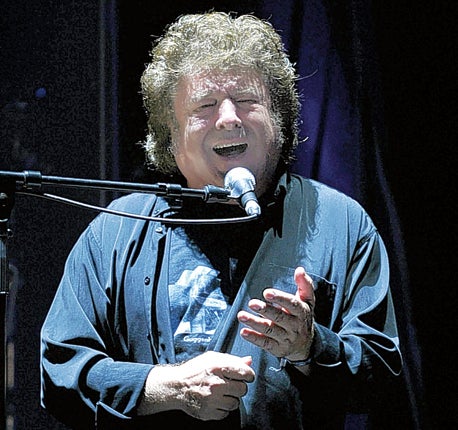Enrique Morente: Singer and composer who helped spearhead flamenco's radical renaissance in the 1970s

Enrique Morente was one of the founding fathers of modern flamenco, a singer and composer who left no stone unturned in his lifelong bid to renovate what had been Spain's most conservative folk-music form. No one but Morente would have had the courage – or originality – to conceive and produce Omega (1996) a multi-layered work fusing punk rock, poetry by Federico Garcia Lorca, songs by Leonard Cohen and flamenco. Omega had (and still has) the purists up in arms, but if Morente's imaginative versatility and willingness to break with convention were two of his musical trademarks, a third made it impossible simply to label him an outcast.
To his critics' frustration Morente was equally talented when it came to traditional flamenco songs, and he would deliver them with searing passion in venues ranging from the Sacromonte caves of his native Granada, to Revolver, Madrid's best-known bastion of rock music, and New York's Carnegie Hall – typically with one hand grasping his jacket lapel and the other outstretched in the classic gesture of the flamenco artist when he lets rip.
Morente's compositions were as likely to draw on poets such as Lorca, Miguel Hernandez, Alberti and San Juan de la Cruz as they were to be influenced by "flamenco teatral", a sometimes ridiculed but musically fertile tendency dating from the middle of the last century which first took flamenco out of the small clubs and towards a mass public.
Such a free-thinking figure was never going to fit easily into a deep-rooted folk-art form like flamenco, and there were times when Morente would be booed off the stage. But his strong sense of humour and natural straightforwardness combined to endow him with a much-needed thick artistic skin.
Enrique Morente was born in 1942 in the Albaicin district in Granada's old quarter – one of flamenco's heartlands in southern Andalusia – into a family with little musical tradition. His first recording was Cante Flamenco, in 1967, which won a Special Mentions award from Spain's Flamenco Institute. But it was Flamenco Homage to Miguel Hernandez (1971), dedicated to the Civil War poet who had died in one of Franco's prisons, that truly put Morente on the map as a broad-based free-thinker willing to work in all of flamenco's genres. "That was the record that got me labelled as a leftie," Morente once said, "although fortunately that's gone now... I've spent my whole life brushing off attempts to label me."
Together with Camaron and Paco de Lucia, Morente was one of a musical triumvirate who spearheaded flamenco's radical renovation in the late 1970s. By 1990 Morente had recorded symphonic flamenco in Allegro Solea, which includes songs in homage to the poet Rafael Alberti. In 1991 he recorded a non-liturgical Flamenco Mass, which features Gregorian Chant, and then in 1992 he made both a musical homage to the mystic poet Saint John of the Cross as well as the far more secular Negra, si tu supieras, a mixture of flamenco with Cuban music.
However it was Omega that offered the most spectacular fusion of styles – flamenco and thrash punk – of all. Based around the poetry of Leonard Cohen and Lorca and produced in collaboration with the Granada punk bandLagartija Nick after much late-night discussion over whisky and interminable chess games in the city's bars, Omega's hauntingly beautiful, utterly unprecedented mixture of the two styles was cold-shouldered by record companies until at last it was independently produced.
Despite the difficult beginnings, Omega brought Morente near-universal acclaim, both from the critics and the public (not to mention Cohen), and the band and singer continued to perform Omega to live audiences as far afield as New York and Buenos Aires right up until last year.
In the final part of Morente's career, the experimentation continued unabated. In 2003, in El Pequeño Reloj (The Little Watch), Morente superimposed his voice on 78rpm recordings of some of flamenco's most prestigious old-school guitarists, such as Sabicas and Manolo de Huelva. Five years later his Pablo de Malaga included texts by Picasso; Morente's untimely death found him working on another record inspired by the same artist, El Barbero de Picasso. He died in hospital in Madrid, apparently from complications arising from an operation on his stomach.
But his musical influence will survive him; his daughter Estrella, a well-known singer, never fails to cite his impact on her work, and other well-established Spanish artists such as Mayte Martin are perhaps closest to his style. He was working for an Italian saxophonist when he died, and today he had been due to receive the Legion d'Honneur medal in France.
Alasdair Fotheringham
Enrique Morente, flamenco singer and composer: born Granada 25 December 1942; married Aurora Carbonell (two daughters, one son); died Madrid 13 December 2010.
Subscribe to Independent Premium to bookmark this article
Want to bookmark your favourite articles and stories to read or reference later? Start your Independent Premium subscription today.

Join our commenting forum
Join thought-provoking conversations, follow other Independent readers and see their replies